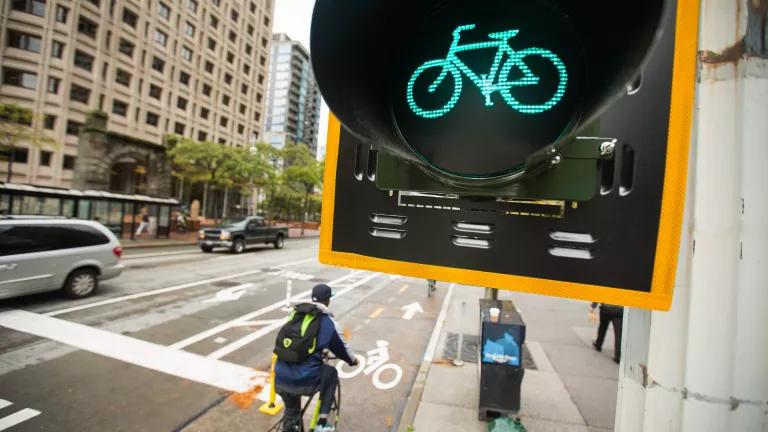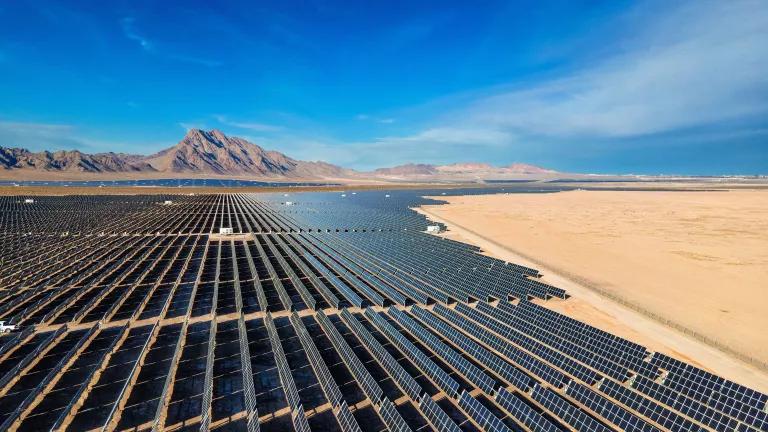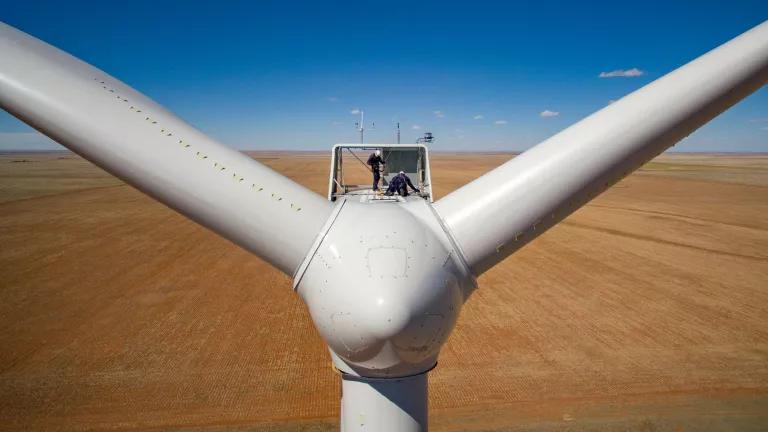Northeast and Mid-Atlantic Green-light Clean Transportation

Update: I've added additional information on the states' first two public workshops, to be held in Boston on April 30 and Newark on May 15, 2019, below.
For too long, residents of Northeast and Mid-Atlantic states have suffered from some of the worst traffic in the country; cars and trucks that spew noxious fumes; outdated infrastructure; overcrowded buses and trains that often don’t run on time or get us where we need to go; and streets that are dangerous for walking and biking. Motor vehicles are also the biggest source of carbon pollution in the region, even more than power plants, which puts our climate at risk. As NRDC’s Transportation Reimagined report makes clear, we can do better. The good news is, a coalition of Northeast and Mid-Atlantic states is working to do just that, and in an announcement today, they’ve provided a roadmap to get there.
This effort will build on and complement other state and local clean transportation initiatives, including congestion pricing, which was just approved for New York City, and significant investments in electric vehicles across the region.
The states are members of the Transportation and Climate Initiative (TCI), a coalition of twelve states—New York, New Jersey, Pennsylvania, Connecticut, Massachusetts, Maine, Maryland, Virginia, Delaware, New Hampshire, Vermont, Rhode Island—and Washington, D.C. Last December, nine of the states and D.C. committed to develop a regional clean transportation policy together in 2019.
They aim to cut pollution, create jobs, boost local economies, improve transportation access and equity, and enhance public health. Measures to do so will likely include improvements in public transportation, expanded use of electric vehicles, and other measures to build more livable and accessible communities for all residents, whether they live in urban, suburban, or rural areas.
Over the next several months, all the TCI states will hold a series of workshops together to solicit input from stakeholders, including residents, businesses, transportation experts, public health professionals, advocates, and others, on the development of a regional policy. These conversations will build on public listening sessions the states held last year in which hundreds of stakeholders from around the region expressed strong support for a regional policy effort.
The workshops will kick off later this month and will cover a variety of topics. More details are in today's announcement. The first three workshops will be as follows:
- April 30 in Boston, MA: Technical Workshop: Regional Cap and Invest for Transportation, Key Design Elements -- Update: in-person registration for this workshop is now closed, but there will be an online livestream available here.
- May 15 in Newark, NJ: Workshop and Roundtable Discussion: Transportation Equity, Addressing Concerns and Creating Opportunities for All Communities -- Update: to register to attend this workshop, click here.
- Date and Location TBA: Technical Workshop: Low-Carbon Transportation Investments, Strategies and Outcomes
As the states work toward a final policy proposal by the end of the year, they have committed to conduct rigorous technical and economic analyses to explore the feasibility, costs, and benefits of potential policy solutions. Most of the TCI states have already been implementing a highly-successful regional policy over the last decade to clean up and modernize the power sector—a policy model that could help tackle our transportation challenges next.
A new NRDC fact sheet on Modernizing Northeast and Mid-Atlantic Transportation explores how this policy, known as “cap-and-invest,” would cut transportation pollution while generating new funding streams to modernize the region’s transportation. These funds could be invested in, for example:
- Upgrades to public transit buses and trains to improve access and reliability; protected bike lanes; improved sidewalks; and other infrastructure and land-use planning to create more livable rural, suburban, and urban communities;
- Programs to modernize public and commercial vehicle fleets, including by switching from polluting diesel vehicles to clean electric transit buses and trucks;
- Investments in economic development, affordable and equitable transit-oriented housing, and other clean transportation solutions in communities that are least well-served by the current transportation system and most overburdened by the negative effects of its pollution; and
- Incentives to enable more residents to use clean electric vehicles, which are not only cheaper to drive per mile, because electricity is cheaper than gasoline, but also save on maintenance because electric vehicles have fewer moving parts to break.
As the states develop the policy, it is critical that they reach out to and address the goals and concerns of frontline communities who suffer disproportionately from the negative effects of our region’s current transportation system. The Climate Justice Alliance (CJA) has developed a set of equity principles for a regional policy, which focus on both the policy-development process and its outcomes. We urge the TCI states to work with frontline communities, including CJA members and others, throughout this process.
Today’s announcement is only the first of many steps the states will take this year to build a better transportation system, but it is a clear and welcome indicator the states are ready to move forward. All stakeholders will have an opportunity to contribute and help shape the final policy over the next several months.
As these discussions continue, it will be critical for the region’s governors, mayors, and legislators to hear from constituents that we need clean and modern transportation solutions that are bold enough to tackle the existing challenges, build a strong and vibrant 21st century economy, and improve people’s everyday lives.



